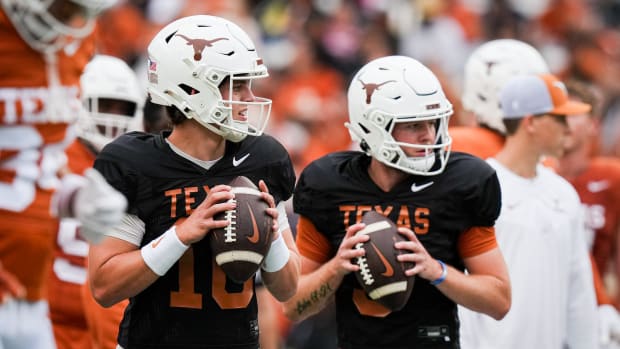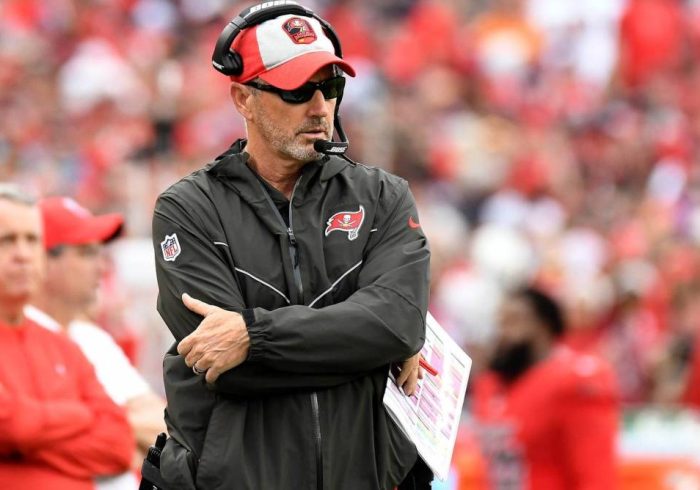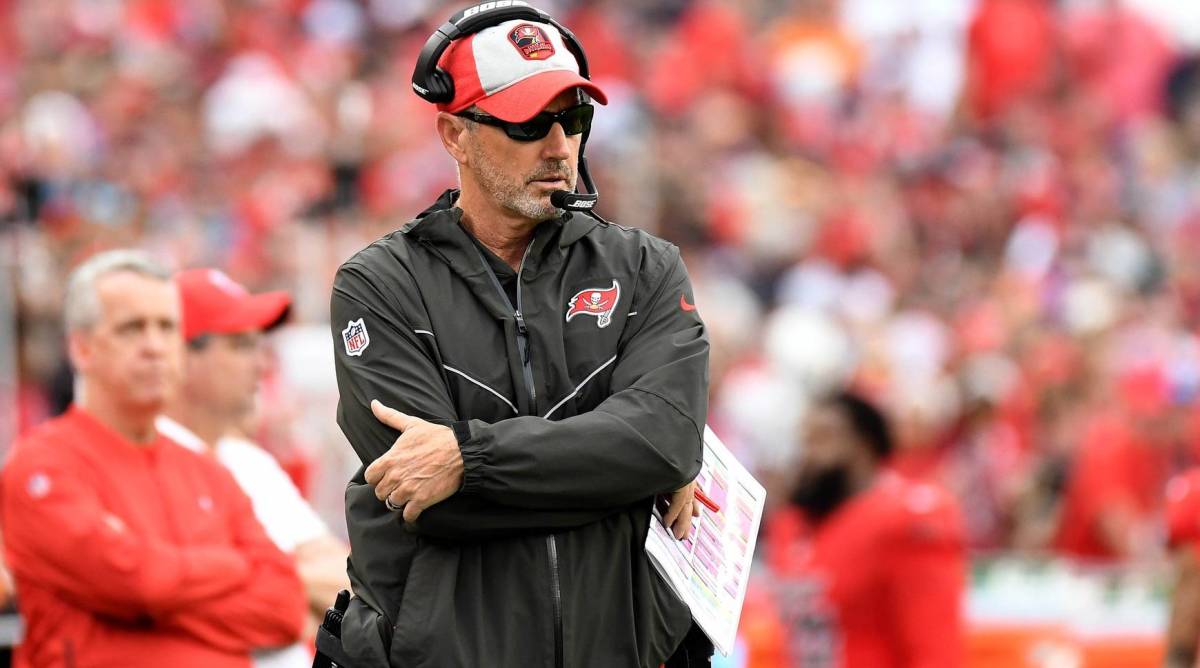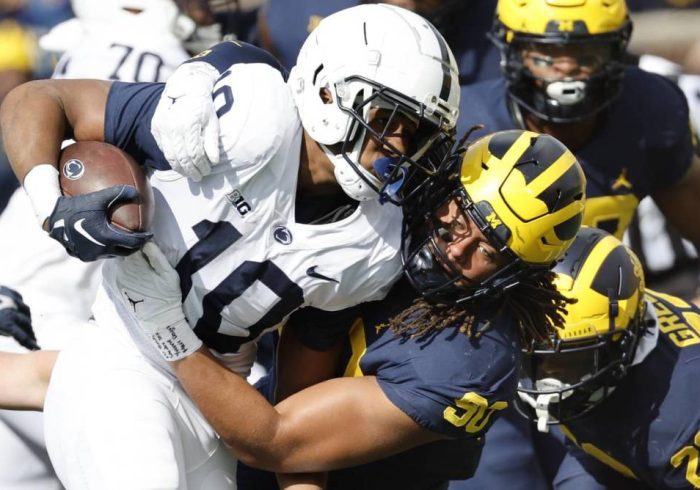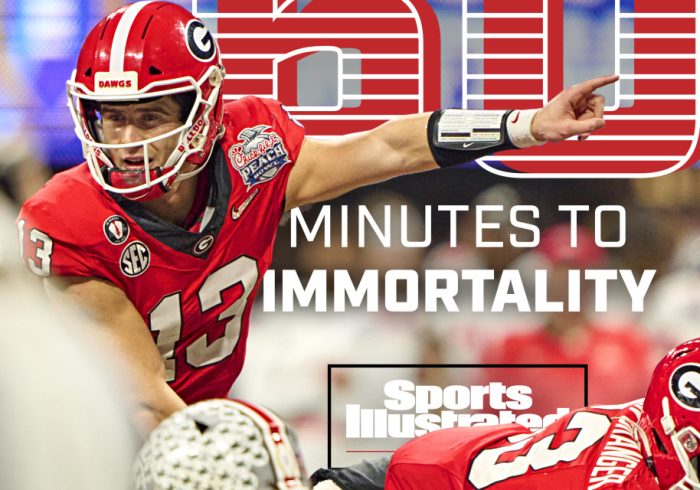Last week’s news in college football was big, but vague. The House v. NCAA settlement is significant and expensive—and also lacking in the details that are necessary to understanding its full ramifications. Nobody knows yet how it’s going to work.
That renders moot most of the big-picture questions lobbed at Southeastern Conference commissioner Greg Sankey at the league’s spring meetings in Destin, Fla. The settlement isn’t fully settled. And with an unsettled settlement, concrete information and tangible answers are in short supply.
But there is some good news amid the non-news: It allows us to talk about actual athletic competition. And 2024–25 is merely shaping up to be the most interesting year in SEC history. Seriously.
Just walking through the host hotel here for these meetings, the sights are jarring and intriguing: the football coach in Alabama Crimson Tide gear isn’t Nick Saban; the Red River rivalry coaches have relocated to the Gulf of Mexico shores; John Calipari is wearing a pullover with a hog on it; Mark Pope replaced him in Lexington; and Dawn Staley is the most accomplished coach of any kind on the premises. There is a lot going on here.
Start with the newbies. The league has expanded, contracted and realigned several times in its 91-year existence, but never like this. The additions of the Texas Longhorns and Oklahoma Sooners have been anticipated for nearly three years, and the arrival is at hand.
Here come programs capable of winning SEC titles immediately in many sports. Including football.
The previous two rounds of expansion ushered in the Arkansas Razorbacks, South Carolina Gamecocks, Missouri Tigers and Texas A&M Aggies. They’ve all had their moments of glory, yet none has won the football league championship. They have cumulatively played in the title game six times (Arkansas three times, Mizzou twice and South Carolina once).
The Longhorns swagger in with preseason top-five credentials. They made the College Football Playoff last season, have a Heisman Trophy–candidate quarterback in the starting lineup (Quinn Ewers) and an even more ballyhooed QB backing him up (Arch Manning). They play a schedule that will demand our attention all season—from visiting the defending national champion Michigan Wolverines for the first time Sept. 7 to hosting the potential No. 1 Georgia Bulldogs on Oct. 19 to resuming old rivalries at Arkansas on Nov. 16 and A&M on Nov. 30, this will be a fascinating season. (Sensitive Texas types might want to prepare themselves for just a few Horns Down signs to be flashed in Fayetteville and College Station.)
The Sooners have more to prove than the Horns, but that could happen if they continue their upward trajectory in Year 3 under Brent Venables. Oklahoma went from a 6–7 bust in 2022 to 10–3 in ’23, including a triumph over Texas. The Sooners are counting on freshman quarterback Jackson Arnold and a rebuilt offensive line, but this could be the program’s best defense in many years. Oklahoma has first-time regular-season matchups with the LSU Tigers, Auburn Tigers, Mississippi Rebels and South Carolina, and resumes old hostilities with Missouri (96 prior meetings).
“We’re not going to surprise anybody,” Venables said. “We’re fortunate and thankful to be a part of it. The challenge of it is incredibly exciting. We’re competing against the best of the best.”
That said: losing the Bedlam Series with Oklahoma State remains a travesty.
As for Alabama’s new reality: The Tide might start the season ranked behind the likes of Ole Miss and Missouri and might also be ranked higher in men’s basketball than football. That might be alarming to Bama fans, but it probably says more about the elevated state of the hoops program, coming off its first Final Four, than the future of the football program.
Kalen DeBoer is an accomplished coach whose 104–12 record—including a 25–3 mark with the Washington Huskies—strongly suggests he’s good enough to win at Alabama. The problem is replacing the greatest coach to ever walk a college sideline. There is no next Saban.
“I’ve got to be who I am and be true to that,” DeBoer said Tuesday. And that should be good enough to keep Bama in the sport’s upper echelon.
The Alabama coach actually hanging out in hallways and conversing was a sight to behold. Saban is famously intolerant of small talk and rarely slowed down when moving from one obligation to the next in Destin. Regardless, if Saban is as good on ESPN’s College GameDay broadcasts as he was analyzing the NFL draft, he will still be adding a lot to the sport.
The new dean of football coaches in the SEC is Kirby Smart, entering Year 9 at Georgia. Ole Miss coach Lane Kiffin said Smart pretty well took up that mantle in meetings Tuesday, and he will at least start the season as the league leader on the field as well.
Think of it this way: The only two games Georgia has lost in the past three seasons were to Saban, and he’s not around anymore. None of the SEC coaches who defeated Smart from 2017–23 are still coaching in the league: nemesis Saban did it five times; Ed Orgeron twice; Dan Mullen, Will Muschamp and Gus Malzahn once each.
But man, the Georgia schedule is a doozy. After opening against the Clemson Tigers in Atlanta, Georgia visits Alabama on Sept. 28, Texas on Oct. 19 and Ole Miss on Nov. 9. The good news for the Bulldogs, and others in the league: In a 12-team playoff, one or even two losses will not be fatal. If the 12-teamer were in effect in recent years, Georgia would have had three more appearances and maybe more national titles.
(In other Georgia news, Smart’s backup quarterback, Jaden Rashada, is suing Florida Gators coach Billy Napier. That will further spike the Cocktail Party game between those two old rivals. Smart pretty much adopted a “My name’s Bennett and I ain’t in it” stance on that topic Tuesday.)
The only sight stranger than DeBoer in Alabama gear was Calipari in Arkansas swag. This is believed to be the first time a national championship men’s basketball coach has moved directly from one conference program to another, a bombshell April development that signaled Cal wasn’t up for the fight of restoring trust (and titles) at Kentucky.
His stump speech at Arkansas sounds numbingly familiar to Big Blue Nation, which steadily grew tired of hearing it as the success stopped accompanying the rhetoric. Cal swiped three of his former players at Kentucky (D.J. Wagner, Adou Thiero and Zvonimir Ivisic) along with three signees (Boogie Fland, Karter Knox and Billy Richmond). But in the current climate of constant player movement, that can’t really be held against him.
As it stands, Arkansas will have a more talented team than Kentucky this season. But Calipari usually has more talent than everyone else in the league and still hasn’t won an SEC tournament title since 2018 or regular-season title since ’20.
His UK successor, Pope, won over hearts and minds by playing to the base: The former standout on the 1996 national championship team rekindled the good feeling of that era, while also declaring, “We’re going to find guys that fit here, the way we play and understand what a gift it is to play at the University of Kentucky.” Yes, that could be perceived as a divergence from the Calipari Era of selling the program as a way station to the NBA.
But the fact remains Pope was not the first choice for the job at his alma mater and only got the call after Scott Drew got well down the road with Kentucky and then decided to stay with the Baylor Bears. Pope has never won an NCAA tournament game; Calipari won 32 of them at Kentucky. The new guy has some work to do beyond winning the news conference.
Calipari wasn’t the only Kentucky coach who tried to leave Lexington for somewhere else in the SEC. Mark Stoops was on his way to College Station to replace Jimbo Fisher before A&M power brokers squashed the move, which led to Mike Elko’s arrival as coach of the Aggies.
He gets the honor of leading A&M into its 119th game against Texas but first since 2011. By the time that game is played at Kyle Field on Nov. 30, the most interesting football season in SEC history will be in its climactic final act. Buckle up for a wild fall on the field; the currently vague future of college sports will sort itself out along the way.
